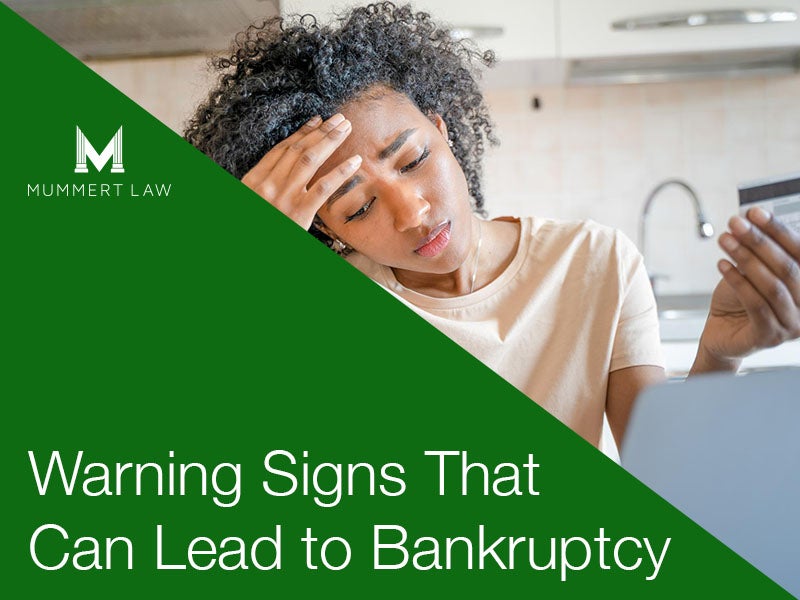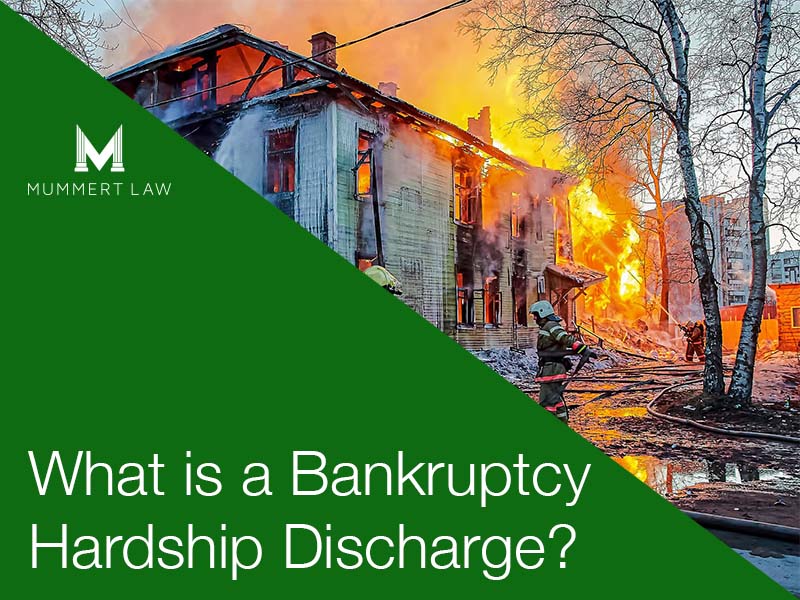-
Warning Signs That Can Lead To Bankruptcy

Finances are complicated for many people these days, and we see record numbers of new bankruptcy cases across the state. But there are signs and symptoms to be aware of that indicate you may be headed for bankruptcy. And being aware of these indicators while working alongside our team at Mummert Law can ultimately help you experience financial relief.
Signs and Symptoms of Bankruptcy for Individuals
There are a variety of indications that you may be on your way to bankruptcy. Though they’re pretty standard, we understand that they can be stressful if you’re experiencing them. The following are some of those early warning signs.
1. If you have more bills or expenses than you can pay
One key indicator is that you have more money going out than coming in. Eventually, you’ll need to manage those expenses. If not, you could face significant financial stress.
2. A life-changing event occurs
Divorce, medical emergencies, a death, or unforeseen layoff can all lead to financial struggles. Once you get behind, bills can add up, and you could face increasing challenges in paying them off.
3. Accumulating credit card debt
People often turn to credit cards when their money runs empty. Unfortunately, this causes a snowball effect. Once your cards have maxed out, you may have to take out a home equity line of credit or pull from your retirement. As a result, you may find that you’re in a financial hole from which you can’t break free.
In addition, paying minimum payments or making late payments, resulting in fees and high-interest rates, can also indicate that you may have to look at bankruptcy.
4. Being contacted by bill collectors and creditors
If you’re 30 days delinquent on your credit card, car, or house payment, don’t be surprised if collection agencies begin contacting you. Their persistent phone calls can add stress and anxiety to an already overwhelming situation.
5. Borrowing money
Another early indicator that you could face bankruptcy is borrowing money from those close to you. You could also be taking cash advances from one credit card to cover another, entangling you and an increasing debt pile.
6. You can’t cover necessary expenses
If you have to put off essential expenditures, like healthcare, you may be at risk of filing for bankruptcy soon.
7. You are often stressed or worried over financial concerns.
Concerns over finances can happen periodically for many people. But if you’re finding that it’s a regular occurrence, causing chronic anxiety, you may be headed for bankruptcy. And to top it off, you may experience health problems due to your stress.
Signs and Symptoms of Bankruptcy for Businesses
Similar to individuals, businesses can also be at risk of filing for bankruptcy. While there is some overlap with personal indicators, organizations face unique challenges and bankruptcy symptoms. The following are some early warning indicators:
- Continual decreases in your cash flow
- Critical leaders or employees leave your organization
- Low cash amount or capital balance
- Unable to satisfy debt obligations like loan or lease payments
- Struggles to meet payroll obligations
- Increasing credit card interest rates
- Continual contact with collection agencies
Being aware of signs and symptoms that predict your potential road to bankruptcy can be a vital first step in finding financial relief. And if you are experiencing any of these warning signs and are concerned bankruptcy is near, we can help! At Mummert Law, we’re available for a consultation. At this time, we’ll sit down together, evaluate your position, and determine the best way to proceed. So don’t go it alone when it comes to financial struggles. Make your appointment with Mummert Law today!
-
What’s A Bankruptcy Hardship Discharge?

Unlike a Chapter 7 bankruptcy, which absolves you from making future payments to your creditors, a Chapter 13 bankruptcy requires a payment plan to be paid in full before discharge. Typically, the debtor pays on this plan for three to five years, with payments determined by debt totals and future income.
But what if something happens during the repayment term, making you unable to pay the agreed-upon payments? Sometimes, things happen that are beyond our control. In these cases, there is a provision in the bankruptcy code, § 1328(b), the hardship discharge.
A bankruptcy hardship discharge is a provision in the code that allows you to stop payments before paying the plan in full but still receive a Chapter 13 discharge. The courts don’t grant this provision often, and it’s only used in extreme cases when all other options are first exhausted.
In What Instances Can A Bankruptcy Hardship Discharge Be Granted?
For a bankruptcy hardship discharge to be granted, the circumstances must occur outside of your control. The court hears each case individually, subject to its jurisdiction and bankruptcy judge. Still, some scenario examples of granting a hardship discharge include:
- Severe illness or injury preventing work
- Job loss
- Debtor death
- Death of debtor’s spouse
- Catastrophic home fire
- Debtor terminal illness
What Requirements Must You Meet for A Bankruptcy Hardship Discharge?
You must exhaust all interventions first before the court considers a bankruptcy hardship discharge in Maryland. When you notify your Trustee of your hardship, they will determine if it’s possible to modify your payment plan agreement.
This may include extending your plan term if it isn’t already at the maximum of five years. Depending on your existing payment amount, the Trustee could also try to lower your payments if they aren’t already at the minimum amount.
Another requirement you must meet to be considered for a bankruptcy hardship discharge is the minimum distribution amount. This means you must have paid your unsecured creditors at least as much as a Chapter 7 bankruptcy liquidation would write off. Meeting this requirement could be challenging if you have significant equity in your primary residence, especially given Maryland’s recent boom in home and property values.
Are There Other Options Besides a Bankruptcy Hardship Discharge?
Yes, there are other options besides a bankruptcy hardship discharge. If the court doesn’t grant you a hardship discharge, you may be able to convert your Chapter 13 case to a Chapter 7 case. You could also dismiss your Chapter 13 case and refile immediately to have a new case heard based on your current situation.
Filing For A Hardship Discharge?
You could be right if you believe you qualify for a hardship discharge. However, there are enough nuances and exceptions within the code, meaning this situation requires a knowledgeable bankruptcy attorney.
Mummert Law in Glen Burnie, Maryland, can review your case and help you decide how to move forward. Contact us today to schedule an appointment to determine if you qualify for a bankruptcy hardship discharge in Maryland.

